LC564 - Citizenship, Community, and Welfare: An Educational Analysis
VerifiedAdded on 2023/06/10
|12
|3242
|282
Report
AI Summary
This report examines the UK's education system, focusing on its role in shaping citizenship, community development, and welfare. It discusses the different stages of education in the UK, from primary to higher education, and evaluates their effectiveness in promoting active citizenship and social well-being. The report also touches upon historical perspectives, comparing ancient education systems with modern ones, and analyzes the impact of policies and reforms on access to education and equality of opportunity. Furthermore, it explores the theoretical approaches to citizenship, including national, social, and consumer citizenship, and their implications for the education system. The report concludes by highlighting the importance of education in empowering individuals, fostering social cohesion, and contributing to the overall development of the society.
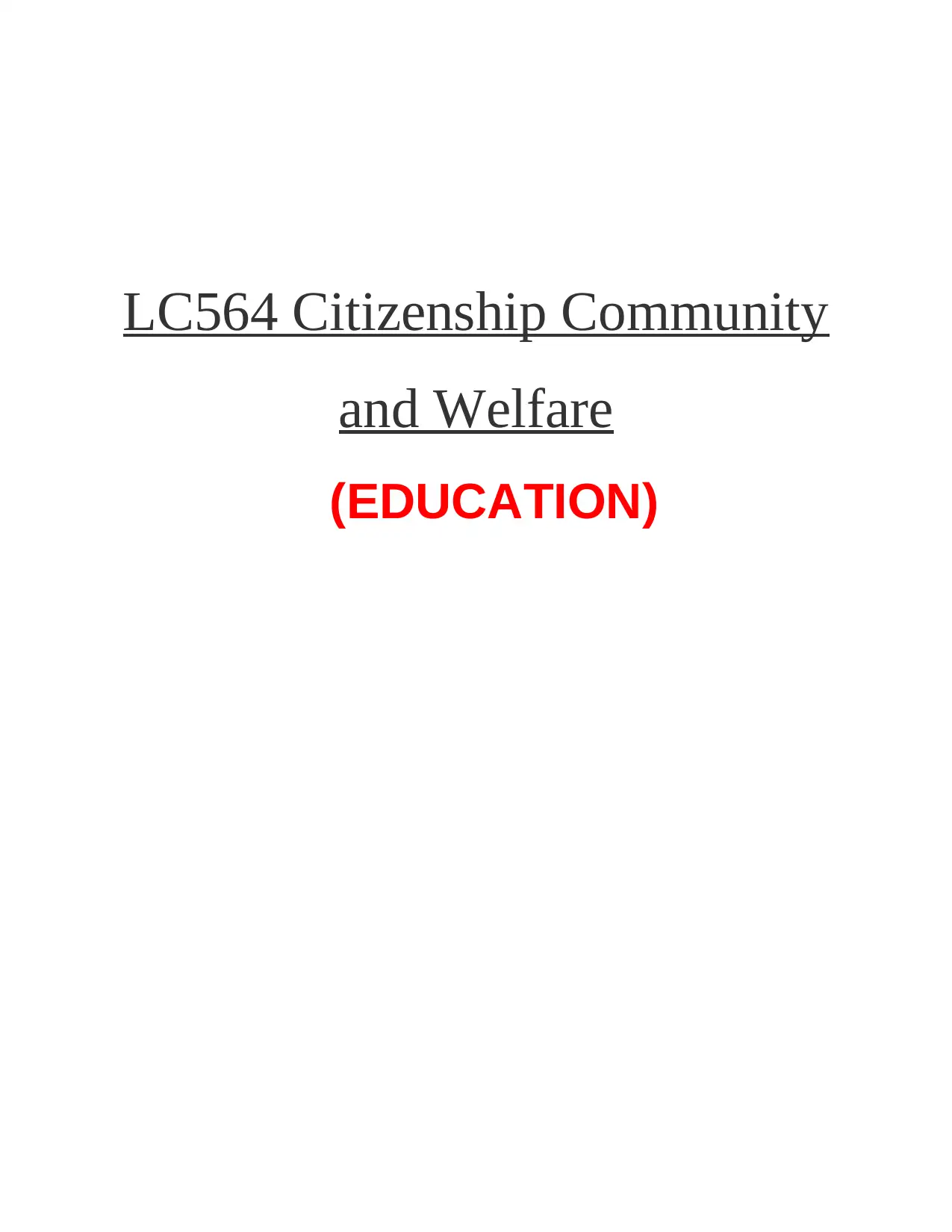
LC564 Citizenship Community
and Welfare
(EDUCATION)
and Welfare
(EDUCATION)
Paraphrase This Document
Need a fresh take? Get an instant paraphrase of this document with our AI Paraphraser
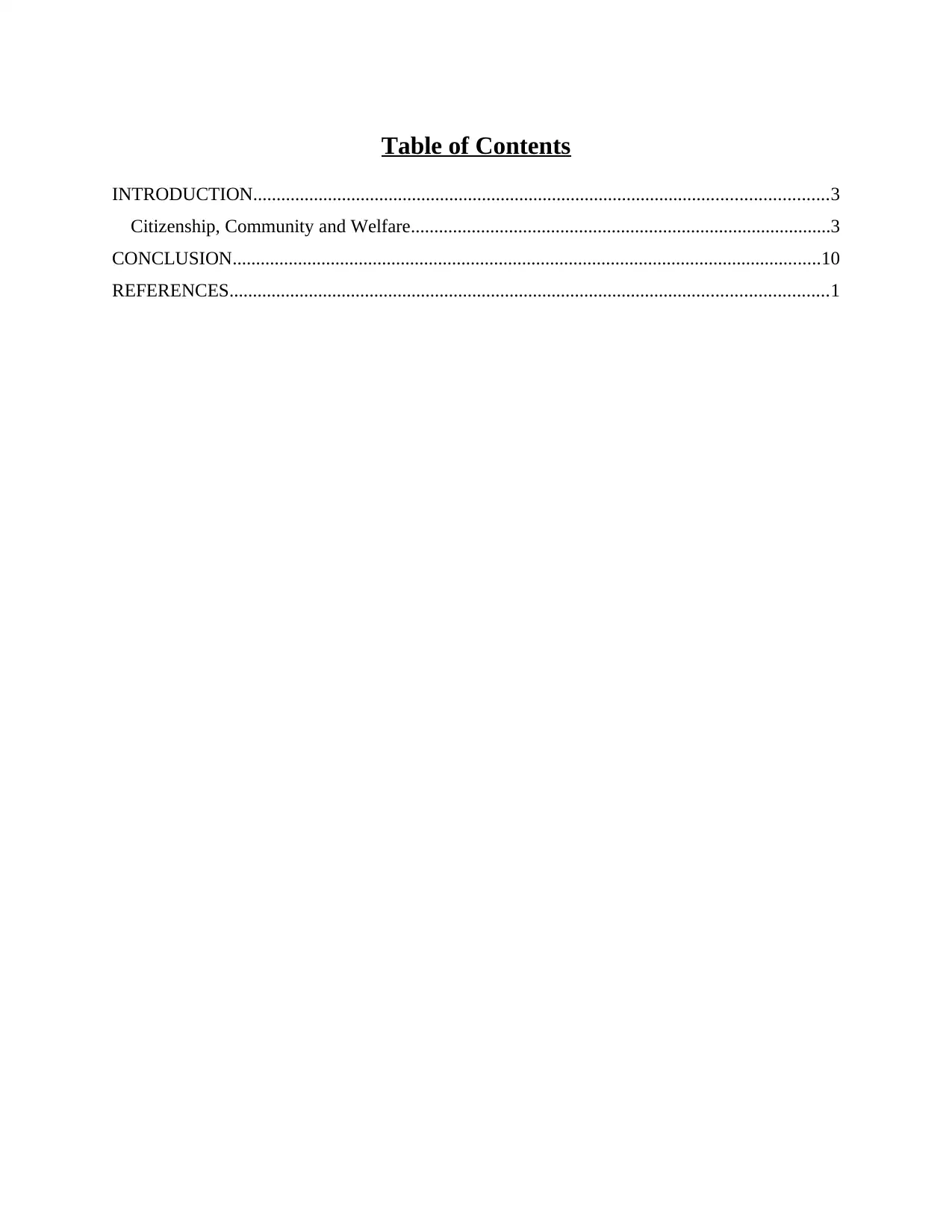
Table of Contents
INTRODUCTION...........................................................................................................................3
Citizenship, Community and Welfare..........................................................................................3
CONCLUSION..............................................................................................................................10
REFERENCES................................................................................................................................1
INTRODUCTION...........................................................................................................................3
Citizenship, Community and Welfare..........................................................................................3
CONCLUSION..............................................................................................................................10
REFERENCES................................................................................................................................1
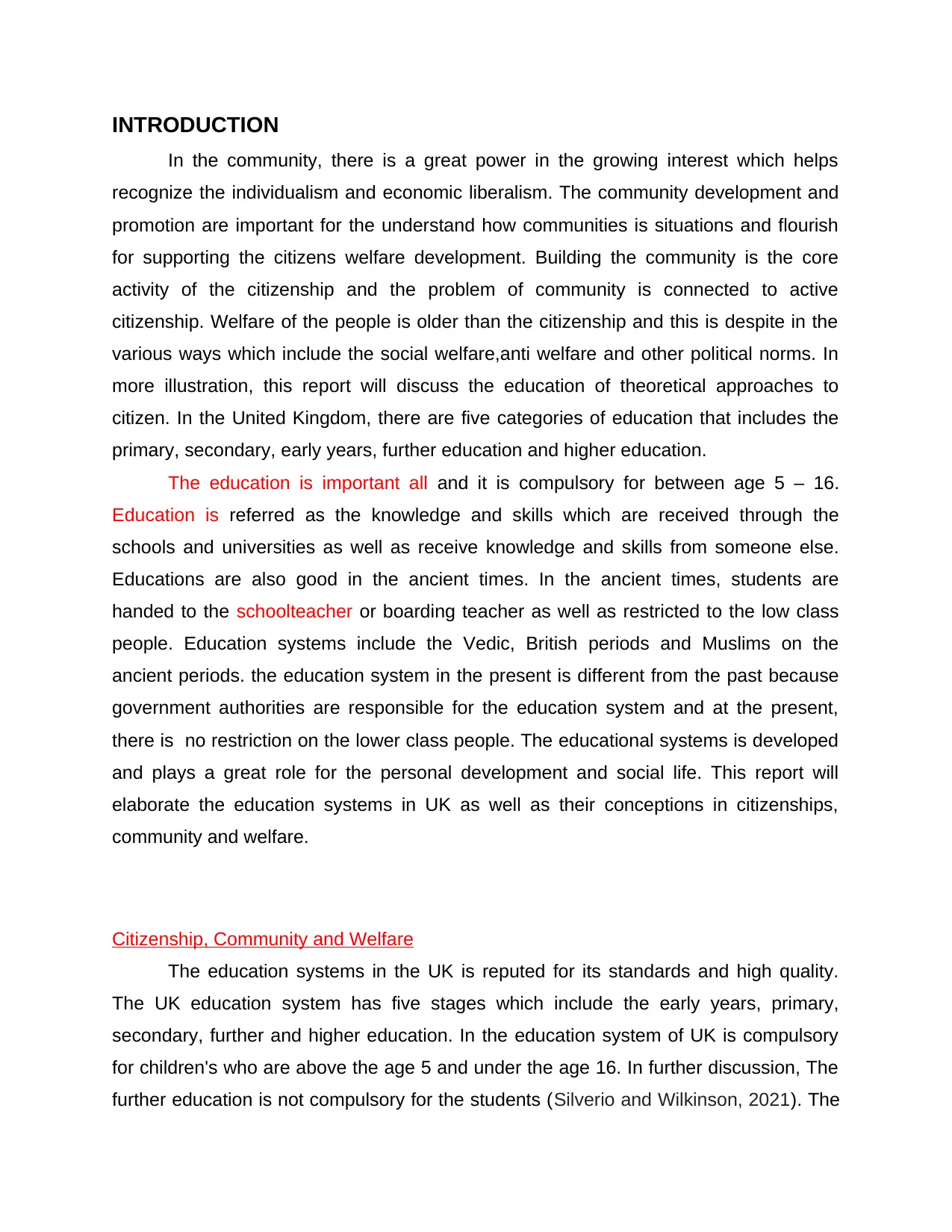
INTRODUCTION
In the community, there is a great power in the growing interest which helps
recognize the individualism and economic liberalism. The community development and
promotion are important for the understand how communities is situations and flourish
for supporting the citizens welfare development. Building the community is the core
activity of the citizenship and the problem of community is connected to active
citizenship. Welfare of the people is older than the citizenship and this is despite in the
various ways which include the social welfare,anti welfare and other political norms. In
more illustration, this report will discuss the education of theoretical approaches to
citizen. In the United Kingdom, there are five categories of education that includes the
primary, secondary, early years, further education and higher education.
The education is important all and it is compulsory for between age 5 – 16.
Education is referred as the knowledge and skills which are received through the
schools and universities as well as receive knowledge and skills from someone else.
Educations are also good in the ancient times. In the ancient times, students are
handed to the schoolteacher or boarding teacher as well as restricted to the low class
people. Education systems include the Vedic, British periods and Muslims on the
ancient periods. the education system in the present is different from the past because
government authorities are responsible for the education system and at the present,
there is no restriction on the lower class people. The educational systems is developed
and plays a great role for the personal development and social life. This report will
elaborate the education systems in UK as well as their conceptions in citizenships,
community and welfare.
Citizenship, Community and Welfare
The education systems in the UK is reputed for its standards and high quality.
The UK education system has five stages which include the early years, primary,
secondary, further and higher education. In the education system of UK is compulsory
for children's who are above the age 5 and under the age 16. In further discussion, The
further education is not compulsory for the students (Silverio and Wilkinson, 2021). The
In the community, there is a great power in the growing interest which helps
recognize the individualism and economic liberalism. The community development and
promotion are important for the understand how communities is situations and flourish
for supporting the citizens welfare development. Building the community is the core
activity of the citizenship and the problem of community is connected to active
citizenship. Welfare of the people is older than the citizenship and this is despite in the
various ways which include the social welfare,anti welfare and other political norms. In
more illustration, this report will discuss the education of theoretical approaches to
citizen. In the United Kingdom, there are five categories of education that includes the
primary, secondary, early years, further education and higher education.
The education is important all and it is compulsory for between age 5 – 16.
Education is referred as the knowledge and skills which are received through the
schools and universities as well as receive knowledge and skills from someone else.
Educations are also good in the ancient times. In the ancient times, students are
handed to the schoolteacher or boarding teacher as well as restricted to the low class
people. Education systems include the Vedic, British periods and Muslims on the
ancient periods. the education system in the present is different from the past because
government authorities are responsible for the education system and at the present,
there is no restriction on the lower class people. The educational systems is developed
and plays a great role for the personal development and social life. This report will
elaborate the education systems in UK as well as their conceptions in citizenships,
community and welfare.
Citizenship, Community and Welfare
The education systems in the UK is reputed for its standards and high quality.
The UK education system has five stages which include the early years, primary,
secondary, further and higher education. In the education system of UK is compulsory
for children's who are above the age 5 and under the age 16. In further discussion, The
further education is not compulsory for the students (Silverio and Wilkinson, 2021). The
⊘ This is a preview!⊘
Do you want full access?
Subscribe today to unlock all pages.

Trusted by 1+ million students worldwide
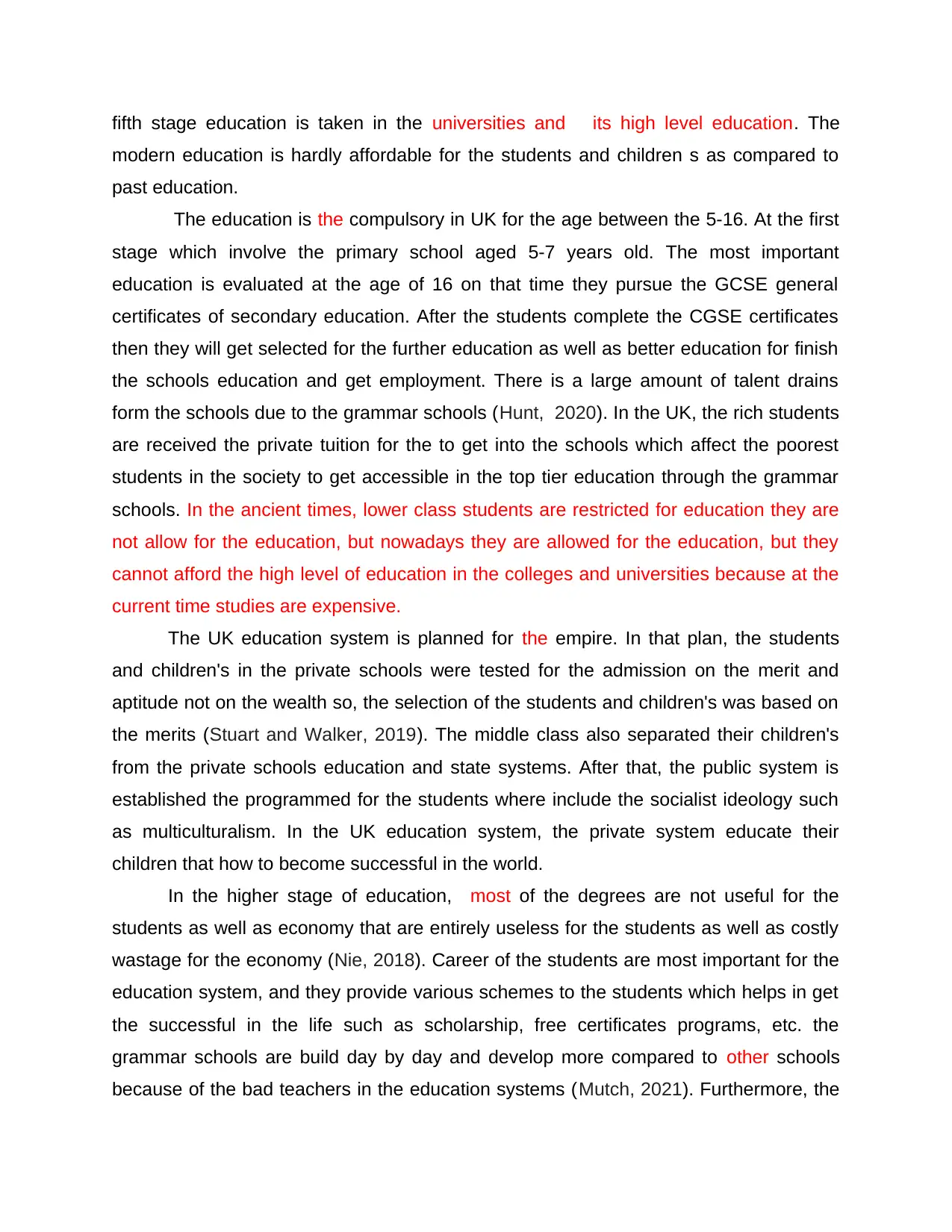
fifth stage education is taken in the universities and its high level education. The
modern education is hardly affordable for the students and children s as compared to
past education.
The education is the compulsory in UK for the age between the 5-16. At the first
stage which involve the primary school aged 5-7 years old. The most important
education is evaluated at the age of 16 on that time they pursue the GCSE general
certificates of secondary education. After the students complete the CGSE certificates
then they will get selected for the further education as well as better education for finish
the schools education and get employment. There is a large amount of talent drains
form the schools due to the grammar schools (Hunt, 2020). In the UK, the rich students
are received the private tuition for the to get into the schools which affect the poorest
students in the society to get accessible in the top tier education through the grammar
schools. In the ancient times, lower class students are restricted for education they are
not allow for the education, but nowadays they are allowed for the education, but they
cannot afford the high level of education in the colleges and universities because at the
current time studies are expensive.
The UK education system is planned for the empire. In that plan, the students
and children's in the private schools were tested for the admission on the merit and
aptitude not on the wealth so, the selection of the students and children's was based on
the merits (Stuart and Walker, 2019). The middle class also separated their children's
from the private schools education and state systems. After that, the public system is
established the programmed for the students where include the socialist ideology such
as multiculturalism. In the UK education system, the private system educate their
children that how to become successful in the world.
In the higher stage of education, most of the degrees are not useful for the
students as well as economy that are entirely useless for the students as well as costly
wastage for the economy (Nie, 2018). Career of the students are most important for the
education system, and they provide various schemes to the students which helps in get
the successful in the life such as scholarship, free certificates programs, etc. the
grammar schools are build day by day and develop more compared to other schools
because of the bad teachers in the education systems (Mutch, 2021). Furthermore, the
modern education is hardly affordable for the students and children s as compared to
past education.
The education is the compulsory in UK for the age between the 5-16. At the first
stage which involve the primary school aged 5-7 years old. The most important
education is evaluated at the age of 16 on that time they pursue the GCSE general
certificates of secondary education. After the students complete the CGSE certificates
then they will get selected for the further education as well as better education for finish
the schools education and get employment. There is a large amount of talent drains
form the schools due to the grammar schools (Hunt, 2020). In the UK, the rich students
are received the private tuition for the to get into the schools which affect the poorest
students in the society to get accessible in the top tier education through the grammar
schools. In the ancient times, lower class students are restricted for education they are
not allow for the education, but nowadays they are allowed for the education, but they
cannot afford the high level of education in the colleges and universities because at the
current time studies are expensive.
The UK education system is planned for the empire. In that plan, the students
and children's in the private schools were tested for the admission on the merit and
aptitude not on the wealth so, the selection of the students and children's was based on
the merits (Stuart and Walker, 2019). The middle class also separated their children's
from the private schools education and state systems. After that, the public system is
established the programmed for the students where include the socialist ideology such
as multiculturalism. In the UK education system, the private system educate their
children that how to become successful in the world.
In the higher stage of education, most of the degrees are not useful for the
students as well as economy that are entirely useless for the students as well as costly
wastage for the economy (Nie, 2018). Career of the students are most important for the
education system, and they provide various schemes to the students which helps in get
the successful in the life such as scholarship, free certificates programs, etc. the
grammar schools are build day by day and develop more compared to other schools
because of the bad teachers in the education systems (Mutch, 2021). Furthermore, the
Paraphrase This Document
Need a fresh take? Get an instant paraphrase of this document with our AI Paraphraser
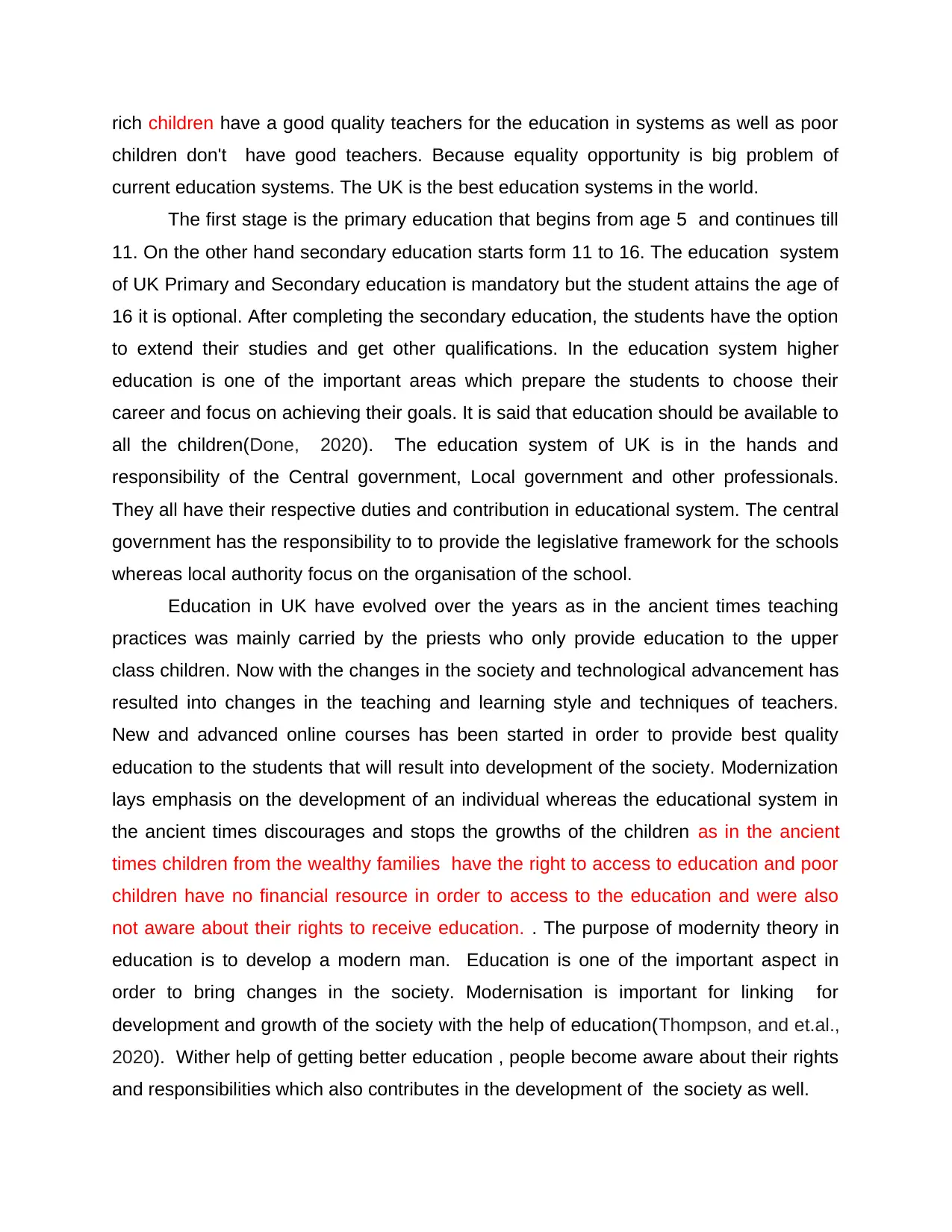
rich children have a good quality teachers for the education in systems as well as poor
children don't have good teachers. Because equality opportunity is big problem of
current education systems. The UK is the best education systems in the world.
The first stage is the primary education that begins from age 5 and continues till
11. On the other hand secondary education starts form 11 to 16. The education system
of UK Primary and Secondary education is mandatory but the student attains the age of
16 it is optional. After completing the secondary education, the students have the option
to extend their studies and get other qualifications. In the education system higher
education is one of the important areas which prepare the students to choose their
career and focus on achieving their goals. It is said that education should be available to
all the children(Done, 2020). The education system of UK is in the hands and
responsibility of the Central government, Local government and other professionals.
They all have their respective duties and contribution in educational system. The central
government has the responsibility to to provide the legislative framework for the schools
whereas local authority focus on the organisation of the school.
Education in UK have evolved over the years as in the ancient times teaching
practices was mainly carried by the priests who only provide education to the upper
class children. Now with the changes in the society and technological advancement has
resulted into changes in the teaching and learning style and techniques of teachers.
New and advanced online courses has been started in order to provide best quality
education to the students that will result into development of the society. Modernization
lays emphasis on the development of an individual whereas the educational system in
the ancient times discourages and stops the growths of the children as in the ancient
times children from the wealthy families have the right to access to education and poor
children have no financial resource in order to access to the education and were also
not aware about their rights to receive education. . The purpose of modernity theory in
education is to develop a modern man. Education is one of the important aspect in
order to bring changes in the society. Modernisation is important for linking for
development and growth of the society with the help of education(Thompson, and et.al.,
2020). Wither help of getting better education , people become aware about their rights
and responsibilities which also contributes in the development of the society as well.
children don't have good teachers. Because equality opportunity is big problem of
current education systems. The UK is the best education systems in the world.
The first stage is the primary education that begins from age 5 and continues till
11. On the other hand secondary education starts form 11 to 16. The education system
of UK Primary and Secondary education is mandatory but the student attains the age of
16 it is optional. After completing the secondary education, the students have the option
to extend their studies and get other qualifications. In the education system higher
education is one of the important areas which prepare the students to choose their
career and focus on achieving their goals. It is said that education should be available to
all the children(Done, 2020). The education system of UK is in the hands and
responsibility of the Central government, Local government and other professionals.
They all have their respective duties and contribution in educational system. The central
government has the responsibility to to provide the legislative framework for the schools
whereas local authority focus on the organisation of the school.
Education in UK have evolved over the years as in the ancient times teaching
practices was mainly carried by the priests who only provide education to the upper
class children. Now with the changes in the society and technological advancement has
resulted into changes in the teaching and learning style and techniques of teachers.
New and advanced online courses has been started in order to provide best quality
education to the students that will result into development of the society. Modernization
lays emphasis on the development of an individual whereas the educational system in
the ancient times discourages and stops the growths of the children as in the ancient
times children from the wealthy families have the right to access to education and poor
children have no financial resource in order to access to the education and were also
not aware about their rights to receive education. . The purpose of modernity theory in
education is to develop a modern man. Education is one of the important aspect in
order to bring changes in the society. Modernisation is important for linking for
development and growth of the society with the help of education(Thompson, and et.al.,
2020). Wither help of getting better education , people become aware about their rights
and responsibilities which also contributes in the development of the society as well.
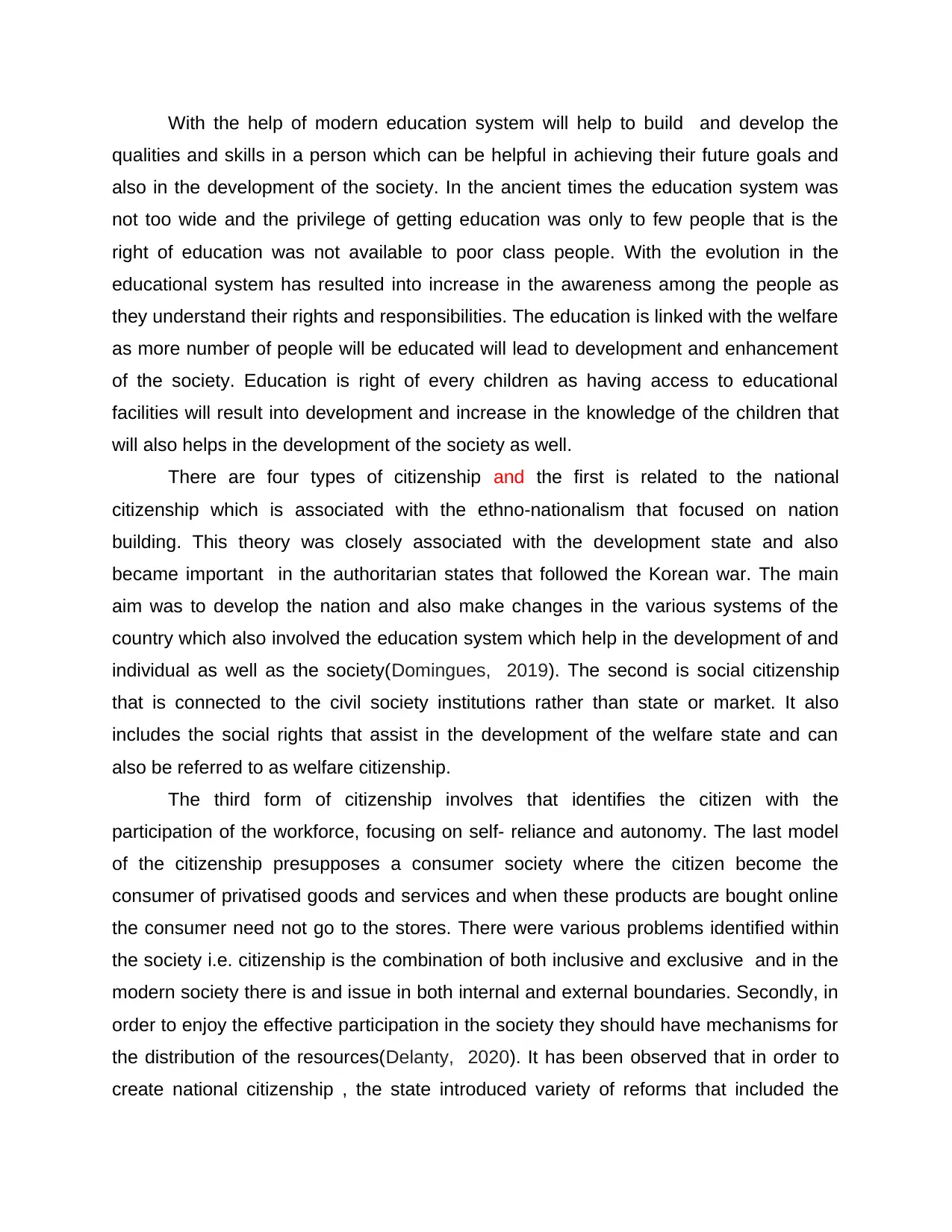
With the help of modern education system will help to build and develop the
qualities and skills in a person which can be helpful in achieving their future goals and
also in the development of the society. In the ancient times the education system was
not too wide and the privilege of getting education was only to few people that is the
right of education was not available to poor class people. With the evolution in the
educational system has resulted into increase in the awareness among the people as
they understand their rights and responsibilities. The education is linked with the welfare
as more number of people will be educated will lead to development and enhancement
of the society. Education is right of every children as having access to educational
facilities will result into development and increase in the knowledge of the children that
will also helps in the development of the society as well.
There are four types of citizenship and the first is related to the national
citizenship which is associated with the ethno-nationalism that focused on nation
building. This theory was closely associated with the development state and also
became important in the authoritarian states that followed the Korean war. The main
aim was to develop the nation and also make changes in the various systems of the
country which also involved the education system which help in the development of and
individual as well as the society(Domingues, 2019). The second is social citizenship
that is connected to the civil society institutions rather than state or market. It also
includes the social rights that assist in the development of the welfare state and can
also be referred to as welfare citizenship.
The third form of citizenship involves that identifies the citizen with the
participation of the workforce, focusing on self- reliance and autonomy. The last model
of the citizenship presupposes a consumer society where the citizen become the
consumer of privatised goods and services and when these products are bought online
the consumer need not go to the stores. There were various problems identified within
the society i.e. citizenship is the combination of both inclusive and exclusive and in the
modern society there is and issue in both internal and external boundaries. Secondly, in
order to enjoy the effective participation in the society they should have mechanisms for
the distribution of the resources(Delanty, 2020). It has been observed that in order to
create national citizenship , the state introduced variety of reforms that included the
qualities and skills in a person which can be helpful in achieving their future goals and
also in the development of the society. In the ancient times the education system was
not too wide and the privilege of getting education was only to few people that is the
right of education was not available to poor class people. With the evolution in the
educational system has resulted into increase in the awareness among the people as
they understand their rights and responsibilities. The education is linked with the welfare
as more number of people will be educated will lead to development and enhancement
of the society. Education is right of every children as having access to educational
facilities will result into development and increase in the knowledge of the children that
will also helps in the development of the society as well.
There are four types of citizenship and the first is related to the national
citizenship which is associated with the ethno-nationalism that focused on nation
building. This theory was closely associated with the development state and also
became important in the authoritarian states that followed the Korean war. The main
aim was to develop the nation and also make changes in the various systems of the
country which also involved the education system which help in the development of and
individual as well as the society(Domingues, 2019). The second is social citizenship
that is connected to the civil society institutions rather than state or market. It also
includes the social rights that assist in the development of the welfare state and can
also be referred to as welfare citizenship.
The third form of citizenship involves that identifies the citizen with the
participation of the workforce, focusing on self- reliance and autonomy. The last model
of the citizenship presupposes a consumer society where the citizen become the
consumer of privatised goods and services and when these products are bought online
the consumer need not go to the stores. There were various problems identified within
the society i.e. citizenship is the combination of both inclusive and exclusive and in the
modern society there is and issue in both internal and external boundaries. Secondly, in
order to enjoy the effective participation in the society they should have mechanisms for
the distribution of the resources(Delanty, 2020). It has been observed that in order to
create national citizenship , the state introduced variety of reforms that included the
⊘ This is a preview!⊘
Do you want full access?
Subscribe today to unlock all pages.

Trusted by 1+ million students worldwide
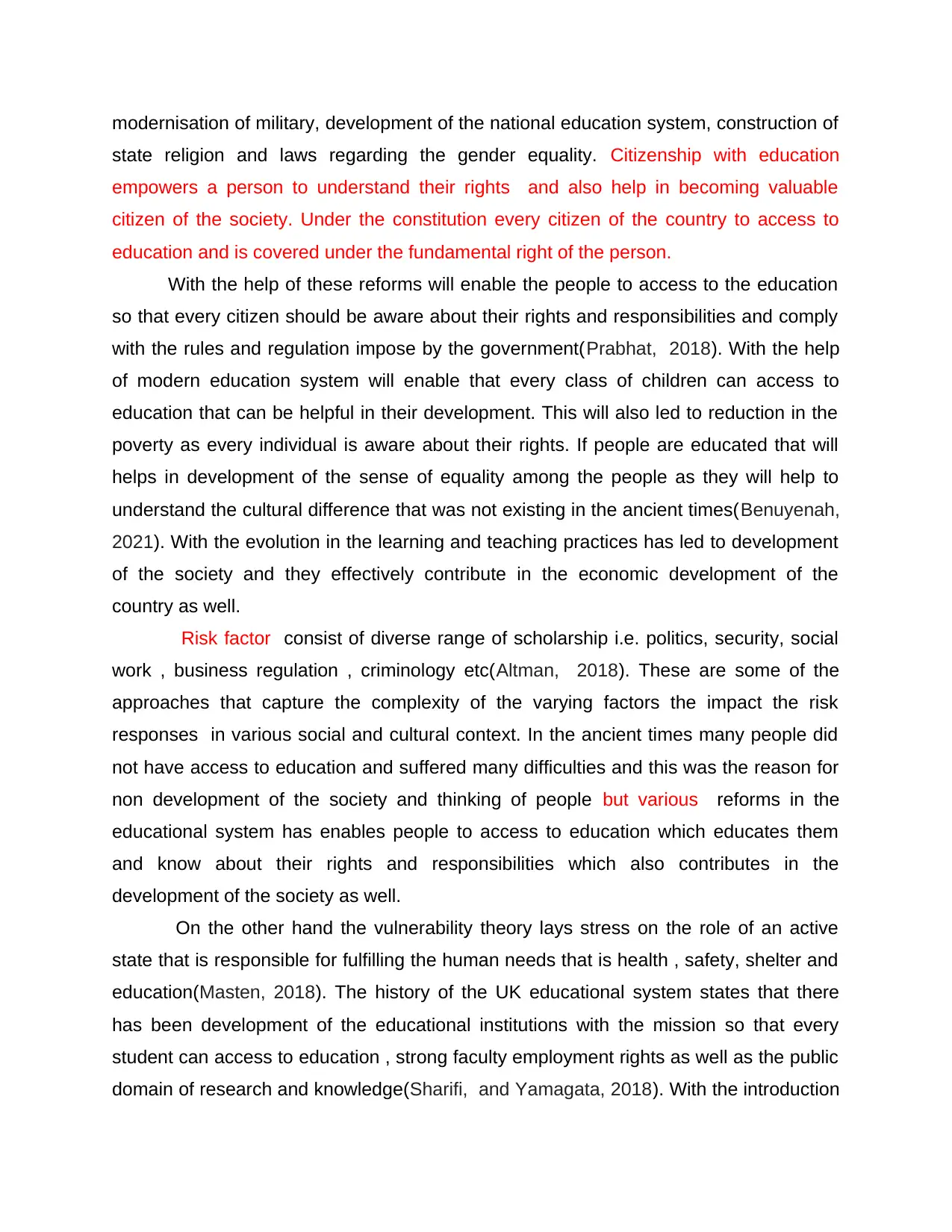
modernisation of military, development of the national education system, construction of
state religion and laws regarding the gender equality. Citizenship with education
empowers a person to understand their rights and also help in becoming valuable
citizen of the society. Under the constitution every citizen of the country to access to
education and is covered under the fundamental right of the person.
With the help of these reforms will enable the people to access to the education
so that every citizen should be aware about their rights and responsibilities and comply
with the rules and regulation impose by the government(Prabhat, 2018). With the help
of modern education system will enable that every class of children can access to
education that can be helpful in their development. This will also led to reduction in the
poverty as every individual is aware about their rights. If people are educated that will
helps in development of the sense of equality among the people as they will help to
understand the cultural difference that was not existing in the ancient times(Benuyenah,
2021). With the evolution in the learning and teaching practices has led to development
of the society and they effectively contribute in the economic development of the
country as well.
Risk factor consist of diverse range of scholarship i.e. politics, security, social
work , business regulation , criminology etc(Altman, 2018). These are some of the
approaches that capture the complexity of the varying factors the impact the risk
responses in various social and cultural context. In the ancient times many people did
not have access to education and suffered many difficulties and this was the reason for
non development of the society and thinking of people but various reforms in the
educational system has enables people to access to education which educates them
and know about their rights and responsibilities which also contributes in the
development of the society as well.
On the other hand the vulnerability theory lays stress on the role of an active
state that is responsible for fulfilling the human needs that is health , safety, shelter and
education(Masten, 2018). The history of the UK educational system states that there
has been development of the educational institutions with the mission so that every
student can access to education , strong faculty employment rights as well as the public
domain of research and knowledge(Sharifi, and Yamagata, 2018). With the introduction
state religion and laws regarding the gender equality. Citizenship with education
empowers a person to understand their rights and also help in becoming valuable
citizen of the society. Under the constitution every citizen of the country to access to
education and is covered under the fundamental right of the person.
With the help of these reforms will enable the people to access to the education
so that every citizen should be aware about their rights and responsibilities and comply
with the rules and regulation impose by the government(Prabhat, 2018). With the help
of modern education system will enable that every class of children can access to
education that can be helpful in their development. This will also led to reduction in the
poverty as every individual is aware about their rights. If people are educated that will
helps in development of the sense of equality among the people as they will help to
understand the cultural difference that was not existing in the ancient times(Benuyenah,
2021). With the evolution in the learning and teaching practices has led to development
of the society and they effectively contribute in the economic development of the
country as well.
Risk factor consist of diverse range of scholarship i.e. politics, security, social
work , business regulation , criminology etc(Altman, 2018). These are some of the
approaches that capture the complexity of the varying factors the impact the risk
responses in various social and cultural context. In the ancient times many people did
not have access to education and suffered many difficulties and this was the reason for
non development of the society and thinking of people but various reforms in the
educational system has enables people to access to education which educates them
and know about their rights and responsibilities which also contributes in the
development of the society as well.
On the other hand the vulnerability theory lays stress on the role of an active
state that is responsible for fulfilling the human needs that is health , safety, shelter and
education(Masten, 2018). The history of the UK educational system states that there
has been development of the educational institutions with the mission so that every
student can access to education , strong faculty employment rights as well as the public
domain of research and knowledge(Sharifi, and Yamagata, 2018). With the introduction
Paraphrase This Document
Need a fresh take? Get an instant paraphrase of this document with our AI Paraphraser
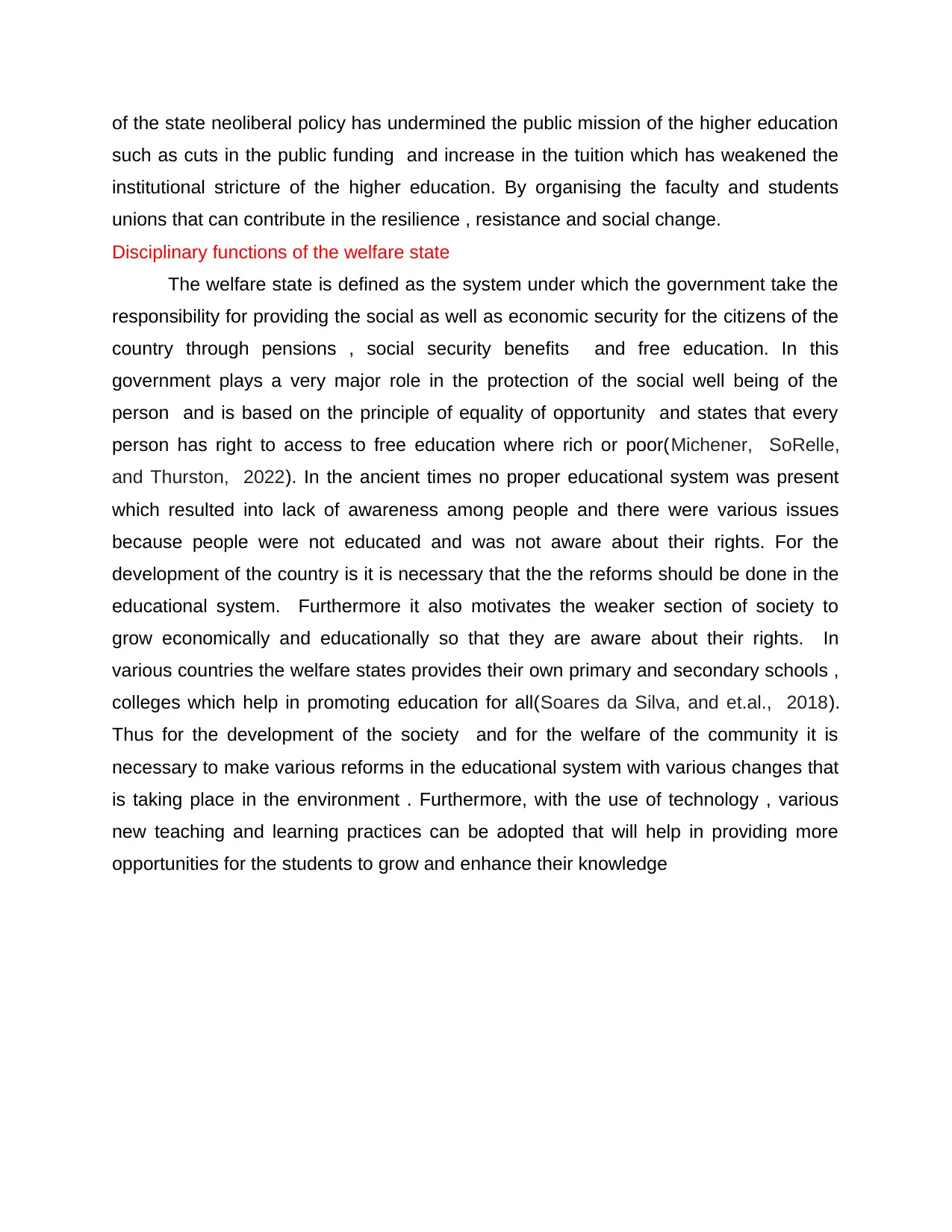
of the state neoliberal policy has undermined the public mission of the higher education
such as cuts in the public funding and increase in the tuition which has weakened the
institutional stricture of the higher education. By organising the faculty and students
unions that can contribute in the resilience , resistance and social change.
Disciplinary functions of the welfare state
The welfare state is defined as the system under which the government take the
responsibility for providing the social as well as economic security for the citizens of the
country through pensions , social security benefits and free education. In this
government plays a very major role in the protection of the social well being of the
person and is based on the principle of equality of opportunity and states that every
person has right to access to free education where rich or poor(Michener, SoRelle,
and Thurston, 2022). In the ancient times no proper educational system was present
which resulted into lack of awareness among people and there were various issues
because people were not educated and was not aware about their rights. For the
development of the country is it is necessary that the the reforms should be done in the
educational system. Furthermore it also motivates the weaker section of society to
grow economically and educationally so that they are aware about their rights. In
various countries the welfare states provides their own primary and secondary schools ,
colleges which help in promoting education for all(Soares da Silva, and et.al., 2018).
Thus for the development of the society and for the welfare of the community it is
necessary to make various reforms in the educational system with various changes that
is taking place in the environment . Furthermore, with the use of technology , various
new teaching and learning practices can be adopted that will help in providing more
opportunities for the students to grow and enhance their knowledge
such as cuts in the public funding and increase in the tuition which has weakened the
institutional stricture of the higher education. By organising the faculty and students
unions that can contribute in the resilience , resistance and social change.
Disciplinary functions of the welfare state
The welfare state is defined as the system under which the government take the
responsibility for providing the social as well as economic security for the citizens of the
country through pensions , social security benefits and free education. In this
government plays a very major role in the protection of the social well being of the
person and is based on the principle of equality of opportunity and states that every
person has right to access to free education where rich or poor(Michener, SoRelle,
and Thurston, 2022). In the ancient times no proper educational system was present
which resulted into lack of awareness among people and there were various issues
because people were not educated and was not aware about their rights. For the
development of the country is it is necessary that the the reforms should be done in the
educational system. Furthermore it also motivates the weaker section of society to
grow economically and educationally so that they are aware about their rights. In
various countries the welfare states provides their own primary and secondary schools ,
colleges which help in promoting education for all(Soares da Silva, and et.al., 2018).
Thus for the development of the society and for the welfare of the community it is
necessary to make various reforms in the educational system with various changes that
is taking place in the environment . Furthermore, with the use of technology , various
new teaching and learning practices can be adopted that will help in providing more
opportunities for the students to grow and enhance their knowledge

⊘ This is a preview!⊘
Do you want full access?
Subscribe today to unlock all pages.

Trusted by 1+ million students worldwide
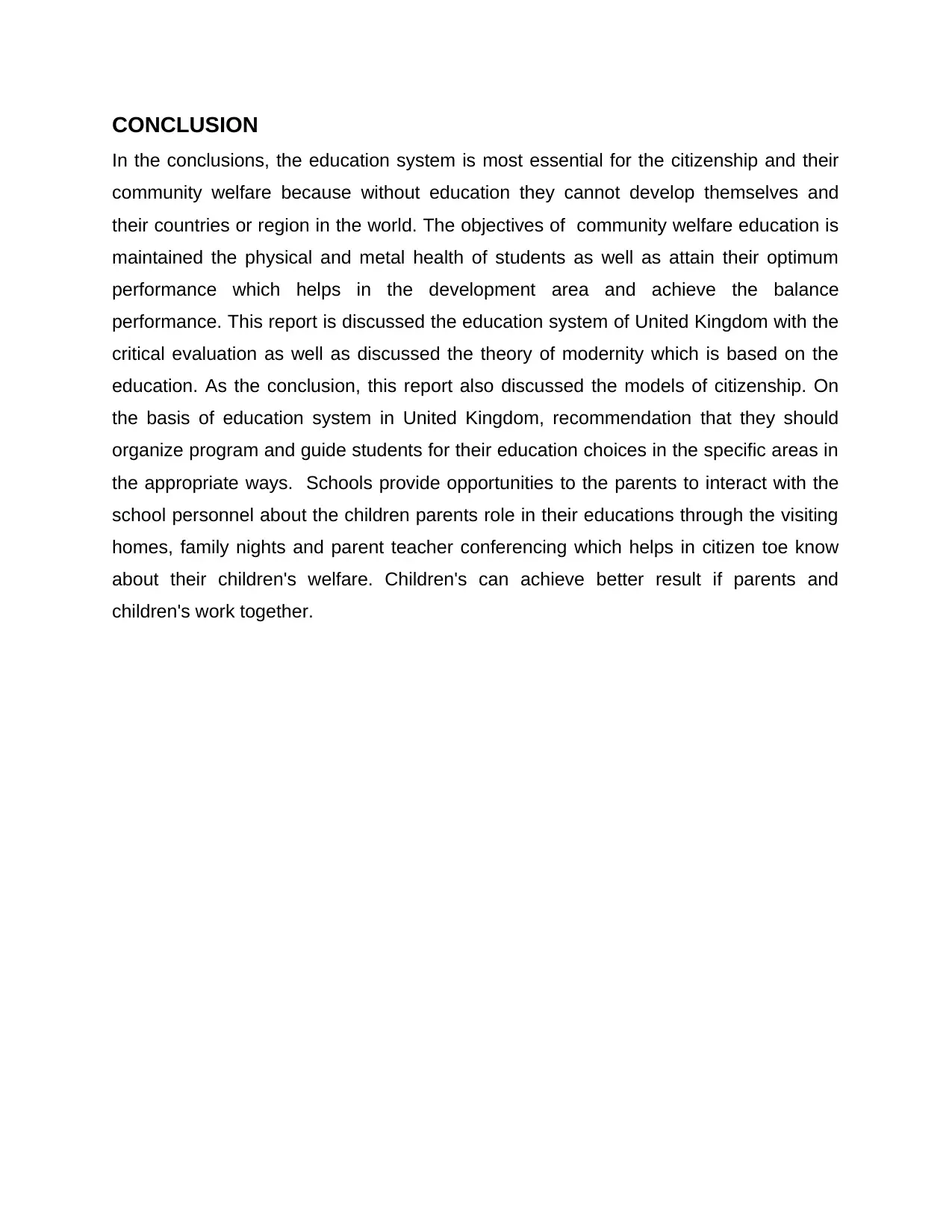
CONCLUSION
In the conclusions, the education system is most essential for the citizenship and their
community welfare because without education they cannot develop themselves and
their countries or region in the world. The objectives of community welfare education is
maintained the physical and metal health of students as well as attain their optimum
performance which helps in the development area and achieve the balance
performance. This report is discussed the education system of United Kingdom with the
critical evaluation as well as discussed the theory of modernity which is based on the
education. As the conclusion, this report also discussed the models of citizenship. On
the basis of education system in United Kingdom, recommendation that they should
organize program and guide students for their education choices in the specific areas in
the appropriate ways. Schools provide opportunities to the parents to interact with the
school personnel about the children parents role in their educations through the visiting
homes, family nights and parent teacher conferencing which helps in citizen toe know
about their children's welfare. Children's can achieve better result if parents and
children's work together.
In the conclusions, the education system is most essential for the citizenship and their
community welfare because without education they cannot develop themselves and
their countries or region in the world. The objectives of community welfare education is
maintained the physical and metal health of students as well as attain their optimum
performance which helps in the development area and achieve the balance
performance. This report is discussed the education system of United Kingdom with the
critical evaluation as well as discussed the theory of modernity which is based on the
education. As the conclusion, this report also discussed the models of citizenship. On
the basis of education system in United Kingdom, recommendation that they should
organize program and guide students for their education choices in the specific areas in
the appropriate ways. Schools provide opportunities to the parents to interact with the
school personnel about the children parents role in their educations through the visiting
homes, family nights and parent teacher conferencing which helps in citizen toe know
about their children's welfare. Children's can achieve better result if parents and
children's work together.
Paraphrase This Document
Need a fresh take? Get an instant paraphrase of this document with our AI Paraphraser
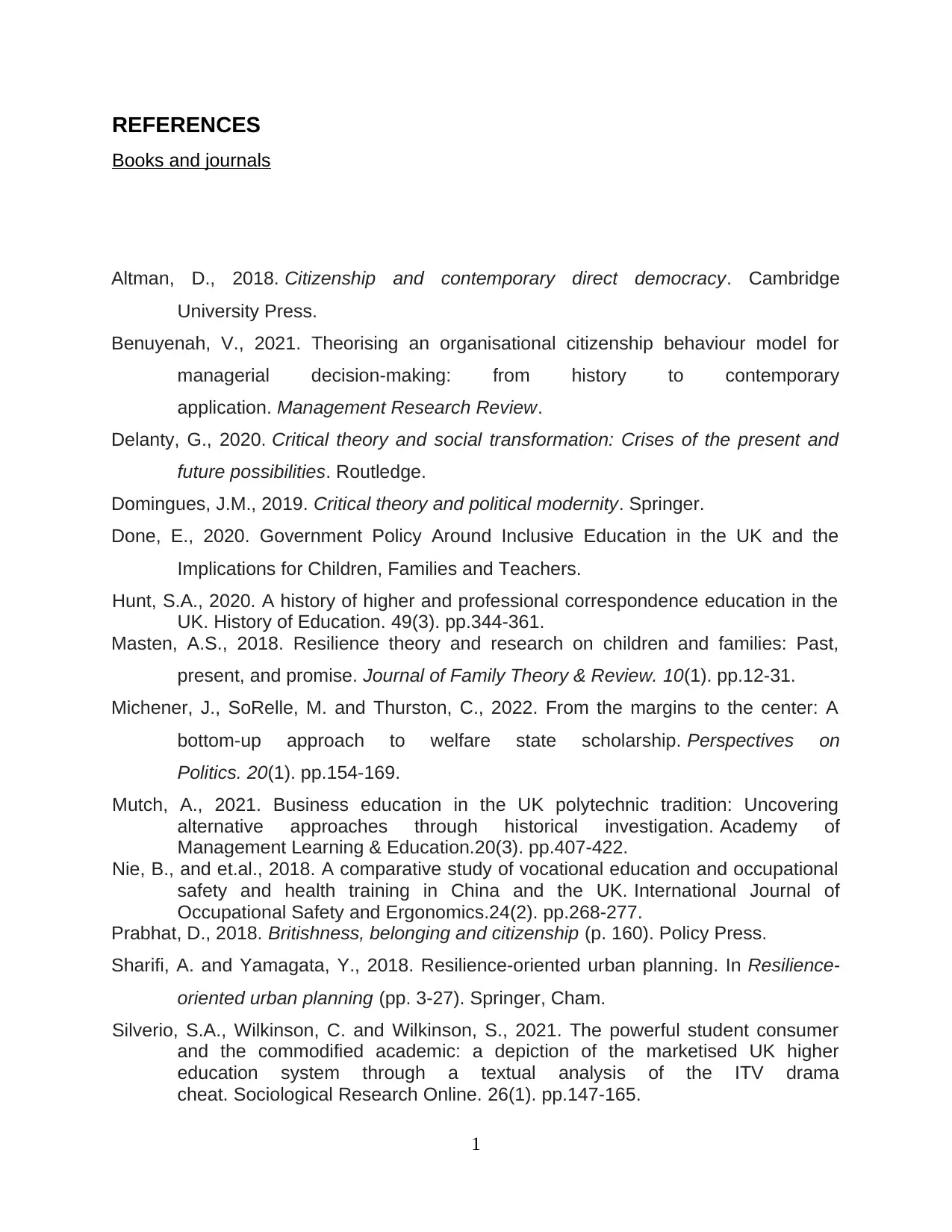
REFERENCES
Books and journals
Altman, D., 2018. Citizenship and contemporary direct democracy. Cambridge
University Press.
Benuyenah, V., 2021. Theorising an organisational citizenship behaviour model for
managerial decision-making: from history to contemporary
application. Management Research Review.
Delanty, G., 2020. Critical theory and social transformation: Crises of the present and
future possibilities. Routledge.
Domingues, J.M., 2019. Critical theory and political modernity. Springer.
Done, E., 2020. Government Policy Around Inclusive Education in the UK and the
Implications for Children, Families and Teachers.
Hunt, S.A., 2020. A history of higher and professional correspondence education in the
UK. History of Education. 49(3). pp.344-361.
Masten, A.S., 2018. Resilience theory and research on children and families: Past,
present, and promise. Journal of Family Theory & Review. 10(1). pp.12-31.
Michener, J., SoRelle, M. and Thurston, C., 2022. From the margins to the center: A
bottom-up approach to welfare state scholarship. Perspectives on
Politics. 20(1). pp.154-169.
Mutch, A., 2021. Business education in the UK polytechnic tradition: Uncovering
alternative approaches through historical investigation. Academy of
Management Learning & Education.20(3). pp.407-422.
Nie, B., and et.al., 2018. A comparative study of vocational education and occupational
safety and health training in China and the UK. International Journal of
Occupational Safety and Ergonomics.24(2). pp.268-277.
Prabhat, D., 2018. Britishness, belonging and citizenship (p. 160). Policy Press.
Sharifi, A. and Yamagata, Y., 2018. Resilience-oriented urban planning. In Resilience-
oriented urban planning (pp. 3-27). Springer, Cham.
Silverio, S.A., Wilkinson, C. and Wilkinson, S., 2021. The powerful student consumer
and the commodified academic: a depiction of the marketised UK higher
education system through a textual analysis of the ITV drama
cheat. Sociological Research Online. 26(1). pp.147-165.
1
Books and journals
Altman, D., 2018. Citizenship and contemporary direct democracy. Cambridge
University Press.
Benuyenah, V., 2021. Theorising an organisational citizenship behaviour model for
managerial decision-making: from history to contemporary
application. Management Research Review.
Delanty, G., 2020. Critical theory and social transformation: Crises of the present and
future possibilities. Routledge.
Domingues, J.M., 2019. Critical theory and political modernity. Springer.
Done, E., 2020. Government Policy Around Inclusive Education in the UK and the
Implications for Children, Families and Teachers.
Hunt, S.A., 2020. A history of higher and professional correspondence education in the
UK. History of Education. 49(3). pp.344-361.
Masten, A.S., 2018. Resilience theory and research on children and families: Past,
present, and promise. Journal of Family Theory & Review. 10(1). pp.12-31.
Michener, J., SoRelle, M. and Thurston, C., 2022. From the margins to the center: A
bottom-up approach to welfare state scholarship. Perspectives on
Politics. 20(1). pp.154-169.
Mutch, A., 2021. Business education in the UK polytechnic tradition: Uncovering
alternative approaches through historical investigation. Academy of
Management Learning & Education.20(3). pp.407-422.
Nie, B., and et.al., 2018. A comparative study of vocational education and occupational
safety and health training in China and the UK. International Journal of
Occupational Safety and Ergonomics.24(2). pp.268-277.
Prabhat, D., 2018. Britishness, belonging and citizenship (p. 160). Policy Press.
Sharifi, A. and Yamagata, Y., 2018. Resilience-oriented urban planning. In Resilience-
oriented urban planning (pp. 3-27). Springer, Cham.
Silverio, S.A., Wilkinson, C. and Wilkinson, S., 2021. The powerful student consumer
and the commodified academic: a depiction of the marketised UK higher
education system through a textual analysis of the ITV drama
cheat. Sociological Research Online. 26(1). pp.147-165.
1
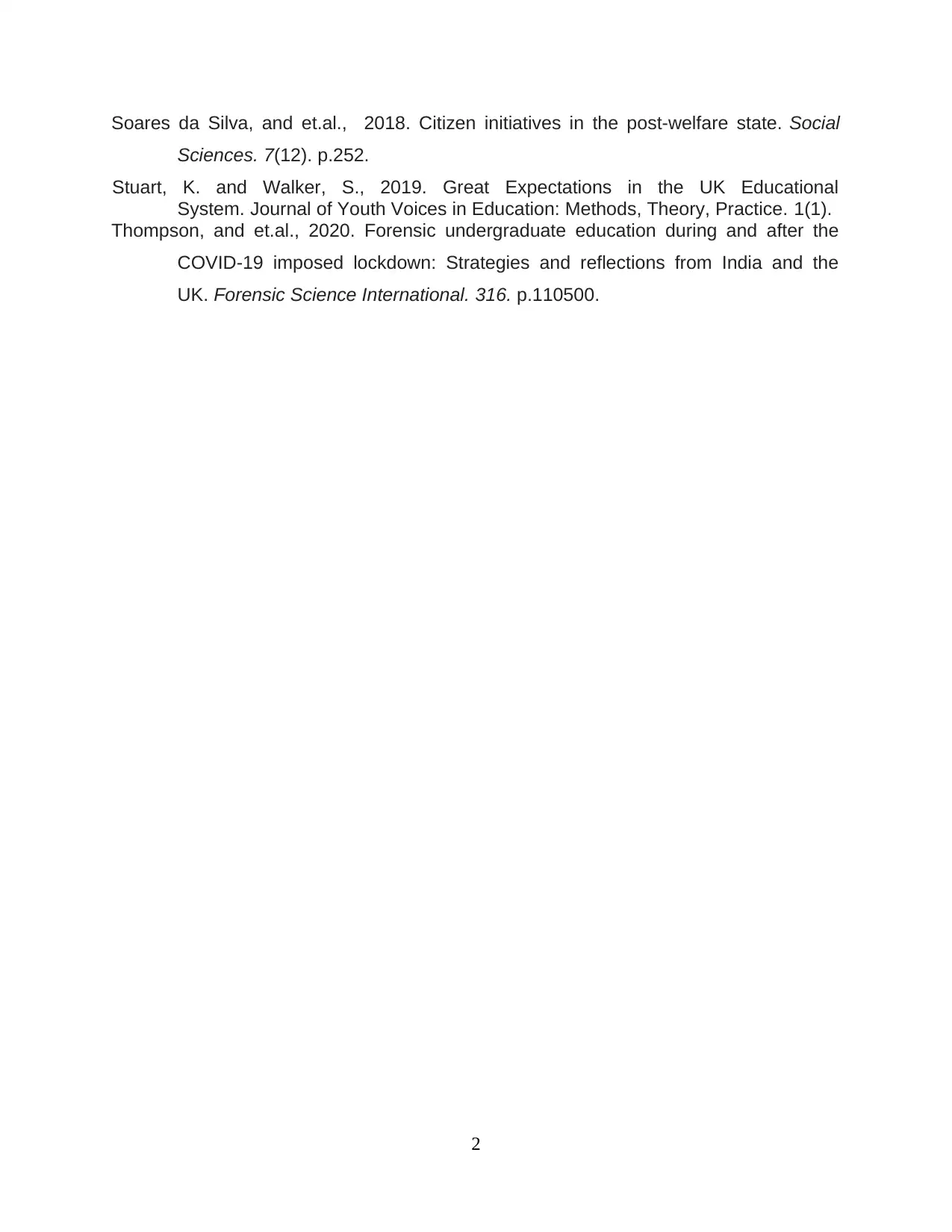
Soares da Silva, and et.al., 2018. Citizen initiatives in the post-welfare state. Social
Sciences. 7(12). p.252.
Stuart, K. and Walker, S., 2019. Great Expectations in the UK Educational
System. Journal of Youth Voices in Education: Methods, Theory, Practice. 1(1).
Thompson, and et.al., 2020. Forensic undergraduate education during and after the
COVID-19 imposed lockdown: Strategies and reflections from India and the
UK. Forensic Science International. 316. p.110500.
2
Sciences. 7(12). p.252.
Stuart, K. and Walker, S., 2019. Great Expectations in the UK Educational
System. Journal of Youth Voices in Education: Methods, Theory, Practice. 1(1).
Thompson, and et.al., 2020. Forensic undergraduate education during and after the
COVID-19 imposed lockdown: Strategies and reflections from India and the
UK. Forensic Science International. 316. p.110500.
2
⊘ This is a preview!⊘
Do you want full access?
Subscribe today to unlock all pages.

Trusted by 1+ million students worldwide
1 out of 12
Related Documents
Your All-in-One AI-Powered Toolkit for Academic Success.
+13062052269
info@desklib.com
Available 24*7 on WhatsApp / Email
![[object Object]](/_next/static/media/star-bottom.7253800d.svg)
Unlock your academic potential
Copyright © 2020–2026 A2Z Services. All Rights Reserved. Developed and managed by ZUCOL.





